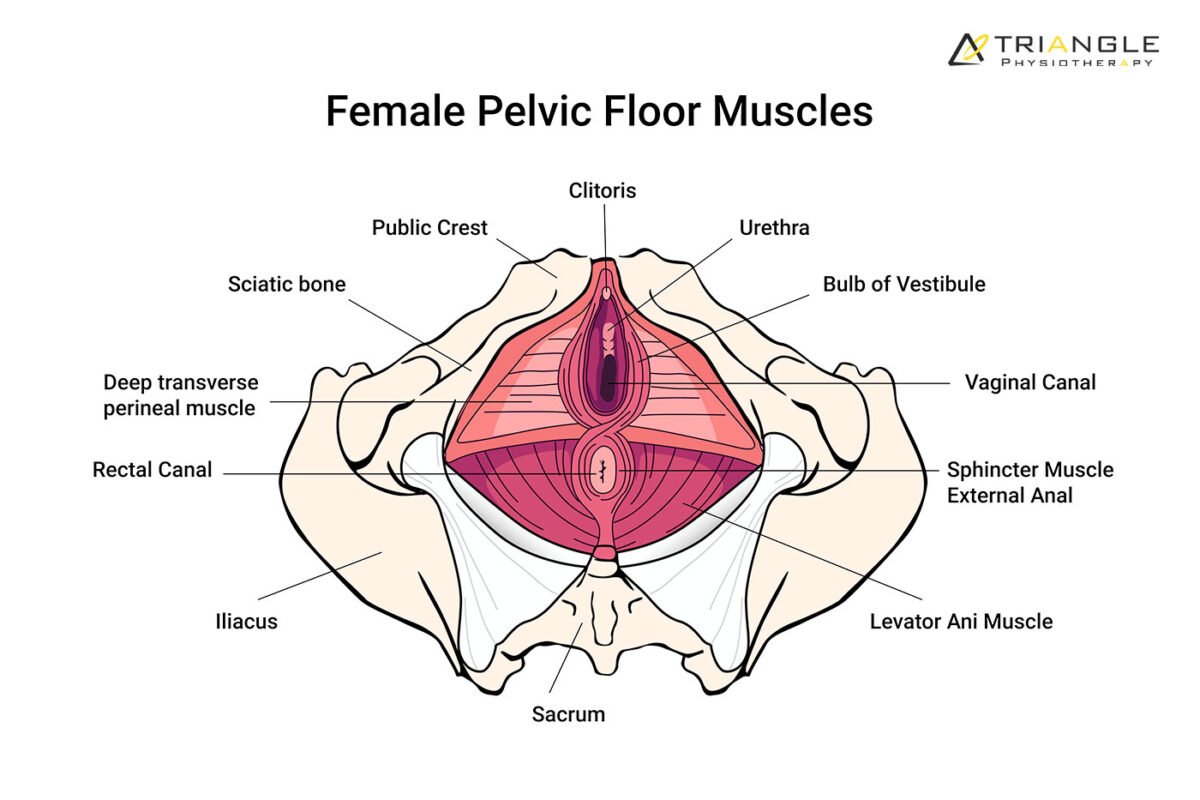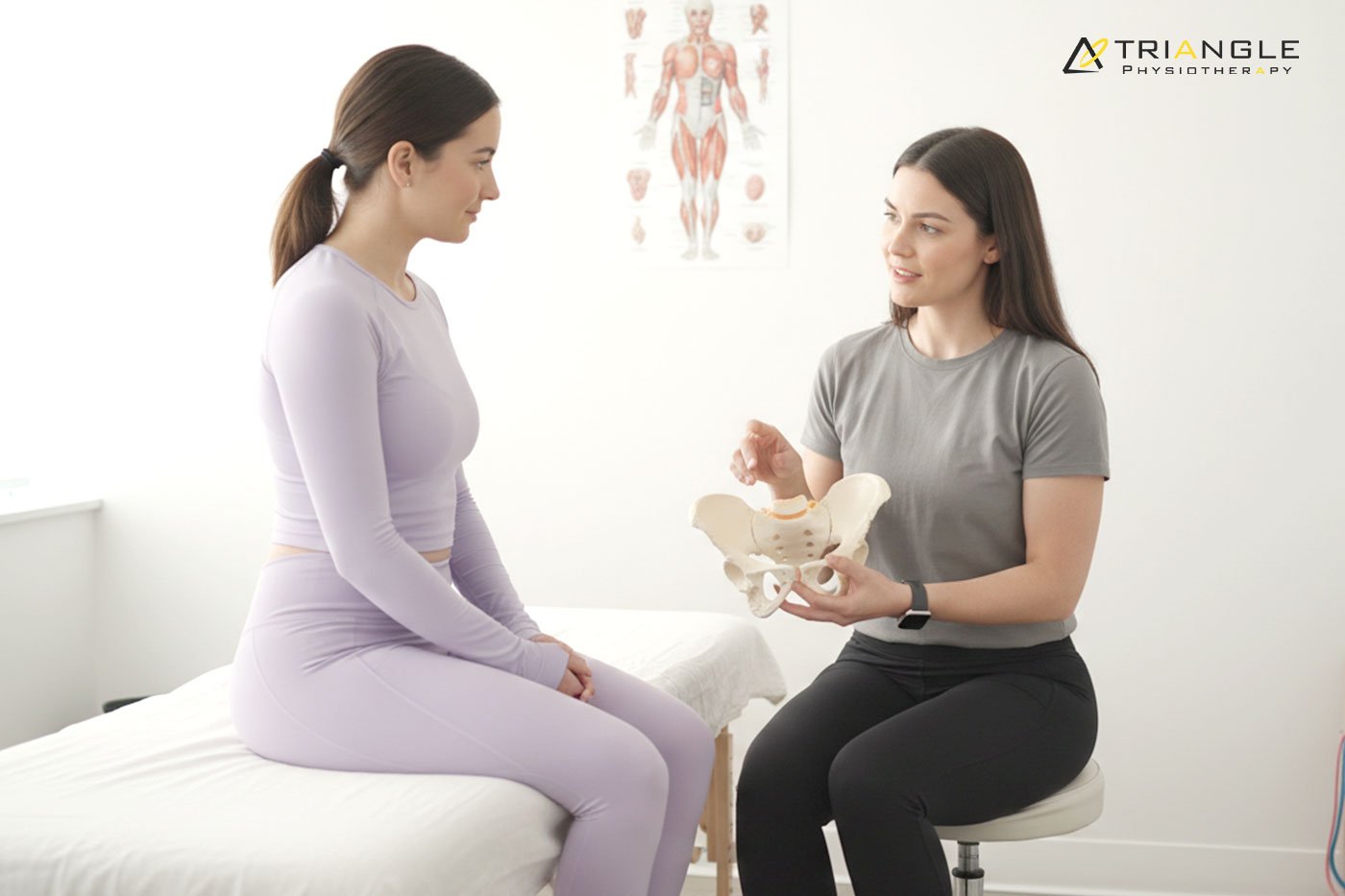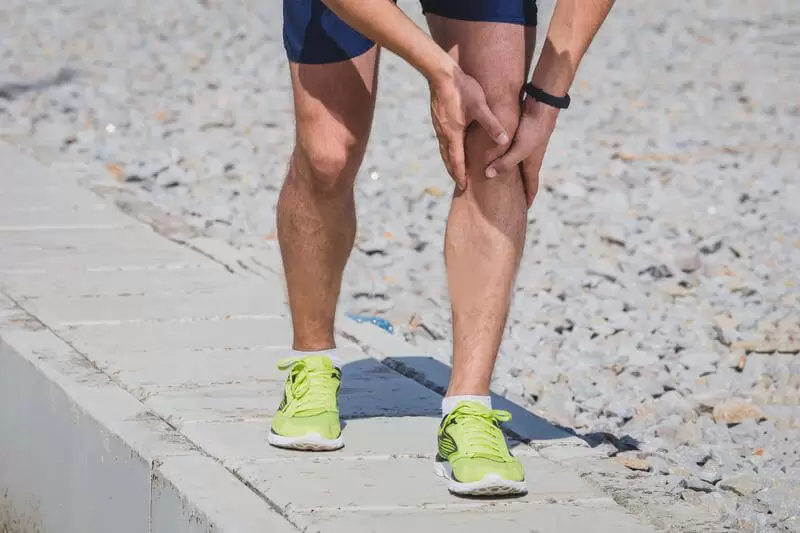Issues with bladder control, bowel function, or sexual health are more common than many people realize, but they’re also some of the most difficult topics to talk about. If you’re experiencing discomfort, leakage, pain, or changes in function, you’re not alone, and help is available. Pelvic floor physiotherapy is a proven, evidence-based solution that can significantly improve quality of life.
For those searching for pelvic floor physiotherapy Toronto or pelvic physiotherapy near me, understanding how this specialized care works is the first step toward feeling better.
What Is Pelvic Floor Physiotherapy?
The pelvic floor is a group of muscles that support the bladder, bowel, and reproductive organs. These muscles play a key role in continence, sexual function, posture, and core stability. When they become weak, tight, or uncoordinated, a range of symptoms can appear.
Pelvic physiotherapy Toronto focuses on assessing and treating pelvic floor dysfunction using gentle, personalized techniques. Treatment is always respectful, confidential, and tailored to your comfort level.
How It Helps Bladder Health
Bladder concerns such as urinary leakage, urgency, frequency, or difficulty fully emptying the bladder are often linked to pelvic floor dysfunction. Pelvic floor physiotherapy helps by:
- Improving muscle strength and coordination
- Teaching bladder control strategies
- Reducing urgency and leakage
- Supporting recovery after childbirth or surgery
With proper guidance, many patients experience meaningful improvement without medication or invasive procedures.
Support for Bowel Function

Bowel-related concerns, such as constipation, straining, fecal leakage, or incomplete emptying, can also be related to pelvic floor muscle dysfunction. Pelvic physiotherapy near me services focus on retraining these muscles to relax and contract appropriately, improving bowel control and comfort.
Education around posture, breathing, and daily habits is often a key part of treatment.
Improving Sexual Health and Comfort

Pain during intercourse, reduced sensation, or pelvic discomfort can significantly impact confidence and relationships. Pelvic floor physiotherapy addresses these issues by:
- Reducing muscle tension and pelvic pain
- Improving blood flow and muscle awareness
- Restoring comfort and function
Care is always patient-led, and physiotherapists work at a pace that feels safe and supportive.
What Makes Specialized Pelvic Care Important?
Not all physiotherapy clinics offer pelvic health services. Choosing an advanced pelvic physiotherapy centre Toronto ensures your care is provided by physiotherapists with specialized training in pelvic health assessment and treatment.
At Triangle Physiotherapy, pelvic floor physiotherapy is delivered with professionalism, discretion, and a strong focus on patient education and empowerment. This specialized approach allows patients to better understand their bodies and take an active role in their recovery.
Finding the Right Physiotherapist in Toronto

When looking for the best physiotherapist in Toronto for pelvic health, experience and communication matter. A good pelvic physiotherapist creates a safe environment, explains each step clearly, and customizes treatment to your individual needs and goals.
Final Thoughts
Bladder, bowel, and sexual health concerns can feel overwhelming, but they are treatable. Pelvic floor physiotherapy in Toronto offers a safe, effective path toward improved comfort, confidence, and daily function.
If you’re searching for trusted pelvic physiotherapy near me, Triangle Physiotherapy provides compassionate, evidence-based pelvic health care designed to support your well-being, every step of the way.
A Quiet Strength That Deserves Care
At Triangle Physiotherapy, we believe some of the most important muscles in your body are also the most overlooked. Your pelvic floor plays a vital role in posture, movement, bladder and bowel control, and overall core stability. When it’s not functioning at its best, daily life can feel uncomfortable or limiting. That’s where pelvic floor physiotherapy comes in – gentle, targeted care designed to restore balance, strength, and confidence.
What Is Pelvic Floor Physiotherapy?
Pelvic floor physiotherapy focuses on assessing and treating the muscles, joints, and connective tissues of the pelvic region. These muscles support your spine and hips and work closely with your core. At our clinic, we take a respectful, evidence-based approach, creating personalized treatment plans that may include guided exercises, breathing techniques, posture correction, and movement education.
Whether symptoms are related to pregnancy, postpartum recovery, sports, prolonged sitting, or everyday stress, pelvic physiotherapy can help improve function and comfort – without judgment and at your pace.
Why Toronto Residents Choose Pelvic Physiotherapy

Living in a fast-paced city like Toronto often means long commutes, desk-based work, and limited recovery time. These factors can place extra strain on the pelvic region. Many people searching for pelvic physiotherapy near me are surprised to learn how common pelvic floor issues are – and how effective physiotherapy can be.
At Triangle Physiotherapy, our goal is not just symptom relief, but long-term improvement. We empower you with knowledge and tools so you feel confident moving through daily life again.
Pelvic Floor Physiotherapy in Etobicoke and Across Toronto
If you’re looking for pelvic floor physiotherapy Etobicoke or elsewhere in the city, our team is proud to serve diverse Toronto communities. We work closely with each client, listening carefully and adjusting care as your body progresses. This personalized approach is why many of our clients consider us among the options when searching for the best physiotherapist in Toronto.
Our clinic blends clinical expertise with a welcoming environment, making Physiotherapy Toronto residents can trust accessible and supportive.
A Triangle Physiotherapy Promise
We see pelvic physiotherapy as a partnership. Your body has an incredible ability to heal when given the right guidance. At Triangle Physiotherapy, we’re here to guide, educate, and support you every step of the way.
If you’re ready to restore balance, rebuild strength, and regain confidence, pelvic floor physiotherapy may be the missing piece. We’re proud to be part of your journey toward better movement and better living – right here in Toronto.
Moving to a new country brings change – new routines, new languages, and often, new health challenges. For many immigrant and refugee women, pelvic health may not be something they’ve had the space or support to focus on. But whether you’re healing after childbirth, living with persistent discomfort, or noticing changes to your bladder or bowel habits, pelvic floor therapy can help.
At Triangle Physiotherapy, we understand that seeking this kind of care can feel intimidating – especially when it’s unfamiliar or culturally sensitive. That’s why we take a respectful, understanding approach to help women from all walks of life get the care they need with dignity.
What Is Pelvic Floor Therapy?
Your pelvic floor is a group of muscles that support the bladder, uterus, and bowel. These muscles can weaken or tighten due to childbirth, trauma, menopause, chronic stress, or even from long-term habits like holding in urine. When your pelvic floor isn’t functioning well, it can lead to symptoms like:
- Leaking urine when you laugh, cough, or lift something
- Pain during intimacy
- Pressure or heaviness in the pelvis
- Difficulty going to the bathroom
- Lower back or hip pain
Pelvic floor therapy is a specialized form of physiotherapy that focuses on restoring strength, mobility, and coordination to these muscles.
Why Cultural Sensitivity Matters

In many cultures, talking about pelvic health is uncomfortable – or even considered off-limits. Some women may have never heard of pelvic therapy before. Others may feel uncertain about what an assessment involves, or fear being judged for asking questions. We hear you. And we’re here to change that experience.
Our physiotherapists are trained to communicate with empathy and simplicity – using plain language, educational visuals, or even interpreter support where needed. We honour each person’s comfort level, and always explain every step before proceeding. You’ll never be rushed, and you’ll always have the option to say “no” or “not today.”
Supporting the Whole Person
For many women who’ve experienced displacement, violence, or trauma, the body holds more than physical tension – it holds emotional memory too. That’s why we offer trauma-informed care, meaning we work with extra gentleness, respect, and awareness of your emotional state. Your trust is never assumed – it’s earned over time.
Financial Support Through IFHP
We’re proud to support newcomers who are eligible under the Interim Federal Health Program (IFHP), which may cover pelvic physiotherapy services. If you’re unsure whether you qualify, our team can help guide you through the process.
Small Steps, Big Changes
You don’t need to live with discomfort. You don’t need to feel embarrassed. You deserve care that sees you as a whole person – not just a patient. At Triangle Physiotherapy, we’re committed to creating a safe, welcoming space where healing feels possible.
If you’re new to Canada and navigating pelvic health concerns, we invite you to book a private session with one of our skilled therapists. We’re here to listen, support, and help you reclaim your strength – one step at a time.
Becoming a mother in a new country comes with more than sleepless nights and diaper changes. For many refugee and newcomer women, the postpartum period is layered with physical healing, emotional weight, and the challenges of adjusting to a new life – often without extended family or familiar support systems.
At Triangle Physiotherapy, we believe that every mother deserves to heal with dignity – especially those who’ve endured the hardships of displacement, trauma, or migration. Postpartum pelvic floor therapy is one important step toward feeling whole again, and we’re here to make that journey a safe and supported one.
The Hidden Struggles After Birth
After childbirth, it’s common to experience pelvic floor symptoms such as:
- Leaking urine when coughing, sneezing, or laughing
- A feeling of heaviness or pressure in the pelvic area
- Pain during intercourse
- Core weakness or back pain
- Difficulty controlling bowel or bladder movements
In many cases, these symptoms are brushed aside as “normal,” especially in communities where pelvic health isn’t openly discussed. But just because something is common doesn’t mean you have to live with it.
A Safe Space to Heal
We know that seeking care for intimate concerns can feel overwhelming – especially if you’re navigating language barriers, unfamiliar healthcare systems, or past trauma. That’s why our approach is gentle, respectful, and culturally aware.
Our physiotherapists use plain language, explain every step, and offer flexible options based on your comfort level. Interpreter services or visual aids are available when needed, and your privacy is always respected. We want you to feel seen, not rushed.
You’ll never be made to feel ashamed of your body, your experience, or your questions.
Why Pelvic Therapy Matters for Refugee Mothers

Many refugee mothers have gone through high-stress pregnancies or deliveries in challenging environments. Some may have experienced traumatic births, long journeys, or physical strain without access to postpartum care. These experiences can affect how the body recovers—and how safe you feel in your own skin.
Pelvic floor therapy helps rebuild strength, relieve pain, and restore control over your body. But beyond that, it’s about giving you back a sense of confidence, autonomy, and peace – because you deserve to feel like yourself again.
Coverage Through IFHP
Triangle Physiotherapy offers services covered under the Interim Federal Health Program (IFHP) for eligible refugee patients. If you’re unsure about your coverage or how to access care, our team will guide you through each step – no judgment, just support.
You Are Not Alone
If you’re a postpartum refugee mom, know this: your healing matters. Your body has carried you through so much. You deserve care that honors not just your physical needs, but your story too.
At Triangle Physiotherapy, we’re here to walk beside you with compassion, clinical expertise, and a commitment to your recovery.
Reach out today. Let’s take that first step – together.
What to expect and how to feel empowered from day one
When it comes to pelvic health, there’s often a mix of curiosity, concern, and even confusion – especially if you’ve never seen a pelvic physiotherapist before. Whether you’re navigating postpartum recovery, persistent discomfort, or changes with age, know this: you’re not alone, and help is closer than you think.
At Triangle Physiotherapy North York, we know that walking into your first pelvic physiotherapy appointment can feel like a big step. That’s why we’ve created a safe, welcoming environment where education and empathy come first.
Here’s what to expect – plus some helpful prep tips so you can feel confident and informed ahead of your first visit.
What Is Pelvic Physiotherapy?
Pelvic physiotherapy focuses on the muscles, ligaments, and connective tissues that support the bladder, uterus (or prostate), and bowel. When these structures are weak, tight, or not working in coordination, it can lead to issues like:
- Bladder leaks or urgency
- Pain during sex
- Constipation
- Pelvic or lower back pain
- Heaviness or pressure in the pelvic region
- Discomfort during movement or exercise
Pelvic physiotherapy in North York is designed to assess and treat these concerns through a combination of hands-on therapy, targeted exercises, posture training, and patient education.
What Happens at Your First Appointment?

Your first session at Triangle Physiotherapy North York will feel a lot like a detailed conversation mixed with gentle movement-based assessment.
Here’s a breakdown of what to expect:
- History & Concerns: We start with your story. This includes your symptoms, medical background, lifestyle habits, and any previous injuries or surgeries.
- Education & Consent: We explain how the pelvic floor functions and what could be contributing to your symptoms. If an internal assessment is helpful, it’s discussed with complete transparency and only done with your full, informed consent.
- Movement & Posture Check: You may be asked to walk, squat, or move in certain ways so we can observe muscle coordination and alignment.
- Personalized Plan: Based on your needs, we build a care plan with treatment goals, exercises, and follow-up recommendations.
The goal? Helping you feel heard, informed, and never rushed. You’re in charge of your journey – we’re simply your support team.
Tips Before You Arrive
- Wear comfy clothes that let you move freely
- Bring a list of symptoms, questions, or goals
- Come with an open mind – pelvic physio is often gentler and more holistic than people expect
Why Triangle Physiotherapy North York?
We take pride in being a trusted name for pelvic physiotherapy in North York, with an emphasis on:
- Respectful, patient-centered care
- Highly trained pelvic health therapists
- Private, one-on-one sessions
- Flexible scheduling and direct billing options
- A clinic culture that prioritizes comfort, dignity, and real progress
Your First Step Starts Here
Taking care of your pelvic health is nothing to be shy about – it’s an important part of your well-being. Whether you’re experiencing symptoms or just want to better understand your body, we’re here to help.
Book your initial pelvic physiotherapy session at Triangle Physiotherapy North York today. Your comfort, confidence, and health matter here.
Selecting an appropriate pelvic physiotherapy clinic is crucial for women’s recovery and long-term health. Whether you’re experiencing pelvic discomfort, issues related to pregnancy, postpartum recovery, or problems with bladder and bowel function, collaborating with a top pelvic health physiotherapist in Toronto guarantees you receive tailored and effective treatment. With numerous options available, the search for the right clinic can feel daunting, but it doesn’t have to be difficult.
We can help you identify what to consider when selecting a pelvic physiotherapy clinic in Toronto and how to find the best option for your specific requirements.
Why Pelvic Physiotherapy is Important for Women’s Health
Pelvic physiotherapy concentrates on the muscles, ligaments, and connective tissues in the pelvic area. These components are essential for supporting the bladder, uterus, and bowel, in addition to maintaining core stability and sexual health.
Here are several prevalent reasons why women pursue pelvic physiotherapy in Toronto:
- Postpartum recovery following vaginal or cesarean births
- Pelvic organ prolapse
- Urinary or fecal incontinence
- Pelvic discomfort or pain
- Pain during intercourse
- Preparation for childbirth
- Menstrual health issues
- Perimenopausal and menopausal symptoms
Engaging with a qualified pelvic health physiotherapist can assist you in regaining strength, enhancing functionality, averting long-term problems, and significantly improving your quality of life.
Key Factors to Consider When Choosing a Pelvic Health Clinic

Choosing the optimal pelvic physiotherapy clinic goes beyond just an online search.
Here’s what to consider:
- Qualifications and Specialization Seek out clinics that have physiotherapists with specialized training in pelvic health, such as certifications in pelvic floor rehabilitation, postpartum care, or women’s health specialties. Suggestion: Inquire about the therapist’s experience in treating your particular condition, like postpartum recovery or pelvic pain related to endometriosis.
- Detailed Assessment and Customized Treatment Plans The foremost physiotherapists in Toronto prioritize understanding your medical history and objectives. An initial comprehensive assessment should incorporate: An in-depth discussion regarding your symptoms and lifestyle A physical examination of your pelvic muscles (when appropriate) A tailored treatment plan that adapts as you make progress
- Privacy and Comfort as pelvic physiotherapy can be a personal experience, the clinic atmosphere should foster a sense of safety and respect. Look for: Private treatment rooms A caring and professional staff Transparent explanations about each step of the process
- Clinic Reputation and Feedback Investigate online reviews and testimonials to assess other patients’ experiences. You may also reach out to friends, family, or your healthcare provider for reliable recommendations on pelvic physiotherapy in Toronto.
- Convenient Location and Adaptable Scheduling Regularity is essential for recovery. A clinic conveniently situated near your home or workplace can facilitate consistent appointment attendance.
Questions to Ask Before You Book
To help you make an educated choice, consider asking these questions when assessing a pelvic physiotherapy clinic:
- What pelvic health certifications do your pelvic health physiotherapists possess?
- How long do assessment and follow-up sessions last?
- Will I have a dedicated physiotherapist throughout my treatment? Do you provide virtual consultations or follow-up care?
- What are the costs and insurance coverage options?
Benefits of Choosing the Right Pelvic Health Physiotherapist
Partnering with the right professional can offer transformative benefits, including:
- Accelerated Recovery: Specialized treatment supports safe and effective healing.
- Pain Relief: Target the underlying causes of pelvic discomfort.
- Increased Confidence: Regain mastery over your body and health.
- Ongoing Wellness: Prevent future complications through education and preventative measures.
By choosing a clinic with experienced therapists and a nurturing environment, you enhance your chances of success.
Final Thoughts: Prioritize Your Health and Comfort
Your pelvic wellness is intricately linked to your overall health. By selecting the top pelvic health physiotherapist in Toronto, you’re making a valuable investment in your future health, self-assurance, and quality of life. Dedicate time to explore clinics, inquire, and make sure you feel at ease with your care team. Finding the right match will make your healing journey more seamless and empowering.
FAQs About Pelvic Physiotherapy in Toronto
- How does pelvic physiotherapy differ from standard physiotherapy?
Pelvic physiotherapy specifically targets the muscles and tissues of the pelvic floor, whereas standard physiotherapy deals with general musculoskeletal issues.
- How many appointments will I require?
This depends on your specific condition. Some individuals notice progress after 4–6 sessions, while others might need ongoing treatment.
- Is pelvic physiotherapy included in insurance plans in Toronto?
The majority of extended health insurance plans do cover physiotherapy services. Be sure to verify your coverage with your provider.
- Can I begin pelvic physiotherapy while I’m pregnant?
Absolutely! In fact, prenatal pelvic physiotherapy can assist in preparing your body for childbirth and subsequent recovery.
- What type of clothing should I wear to my initial appointment?
Opt for comfortable, loose-fitting attire that allows for easy movement.
Conclusion
Selecting the right pelvic physiotherapy clinic in Toronto is a vital step towards improved women’s health and recovery. Concentrate on finding a qualified, caring, and conveniently located provider who comprehends your individual requirements. With the right assistance, you can heal, avert future complications, and rebuild your confidence in your body.
When it comes to sensitive health concerns, finding safe, respectful, and expert care is key. Pelvic floor dysfunction is incredibly common – but too often ignored due to embarrassment or fear of being misunderstood. At Triangle Physiotherapy Toronto, we provide private pelvic physiotherapy sessions in a welcoming, confidential environment where you are fully supported throughout your healing journey.
Here’s what you should know before booking your first pelvic health assessment – and why it might be the most important step you take for your overall well-being.
Why Book a Pelvic Health Assessment?
Pelvic floor issues affect more people than you might think. These include:
- Leaking when coughing, laughing, or exercising
- Pelvic pain or pressure
- Pain during intimacy
- Postpartum recovery concerns
- Constipation or bowel dysfunction
- Recovery after prostate or abdominal surgery
These symptoms can impact physical comfort, mental health, and day-to-day life. Pelvic physiotherapy offers a safe, non-invasive way to treat the root cause – often without medication or surgery.
What to Expect at Triangle Physiotherapy Toronto?

We understand that pelvic health is a personal topic. That’s why our Toronto location prioritizes confidentiality, comfort, and open communication at every step.
Here’s what your private assessment involves:
1. Pre-Appointment Consultation
Once you book your session, you’ll receive a brief intake form that helps your therapist understand your symptoms, medical history, lifestyle, and concerns. This allows us to tailor the session specifically to you.
2. One-on-One, Private Session
All pelvic health sessions at Triangle Physiotherapy Toronto are conducted in private treatment rooms – not shared spaces. You’ll meet with a registered pelvic physiotherapist trained in trauma-informed care and sensitive health communication. We take time to listen and explain everything clearly before beginning the physical assessment.
3. Physical Evaluation
If appropriate and with your full consent, the therapist may perform a gentle internal or external exam to assess your pelvic floor muscles. This step helps us understand strength, tension, and coordination levels to build a precise treatment plan. You are in complete control throughout – nothing happens without your comfort and consent.
What Happens Next?
Your physiotherapist will walk you through a personalized treatment plan that may include:
- Breathing and core engagement techniques
- Pelvic floor strengthening or relaxation exercises
- Manual therapyPostural corrections and ergonomic advice
- Education on bladder/bowel habits or pain management strategies
We also provide home exercises and ongoing support to help you progress between sessions.
Why Triangle Physiotherapy Toronto?
Our goal is to make private pelvic physiotherapy approachable, respectful, and results-driven. With flexible scheduling, direct billing, and a convenient Toronto location, we make it easy to start care without unnecessary stress.
We’ve helped hundreds of clients feel stronger, more confident, and pain-free through compassionate pelvic health care. Whether you’re navigating postpartum recovery, persistent pelvic pain, or just want to feel more in control of your body, we’re here to help.
Take the First Step – Confidently
Booking a confidential pelvic health assessment doesn’t have to feel overwhelming. At Triangle Physiotherapy Toronto, your comfort and care come first.
Book your private session today and take charge of your health, your way.
Because healing doesn’t end after delivery
Bringing a new life into the world is no small feat – and neither is the recovery that follows. While many focus on the baby’s well-being (rightfully so!), new moms often put their own healing on the backburner. But those aches, leaks, or feelings of pressure after childbirth? They’re signals that your body needs care too.
At Triangle Physiotherapy North York, we specialize in postpartum pelvic physiotherapy to help you recover in a way that’s safe, informed, and empowering – no matter what kind of birth you had.
What Happens to the Pelvic Floor After Birth?
During pregnancy and delivery, your pelvic floor muscles go through a lot. These muscles support your bladder, uterus, and bowel – and during childbirth, they stretch, strain, and in some cases, tear.
It’s completely normal to feel different after giving birth. But “common” doesn’t mean “should be ignored.”
Signs your pelvic floor needs attention may include:
- Leaking when you laugh, cough, or run
- Pain or discomfort during intimacy
- A heavy or dragging sensation in your pelvis
- Ab separation (diastasis recti)
- Trouble regaining core strength
- Lower back or hip pain
If you’re experiencing any of these, know that postpartum pelvic physiotherapy in North York can help you feel stronger, more comfortable, and more confident in your body again.
How Physiotherapy Helps with Postpartum Recovery

At Triangle Physiotherapy North York, we create personalized recovery plans tailored to your birth experience, current symptoms, and future goals – whether that’s lifting your baby pain-free or getting back to your workout routine.
Here’s how we support your healing:
- Pelvic floor rehab: Gentle techniques to restore muscle tone, function, and coordination
- Core reconditioning: Safe exercises to reconnect with your deep abdominal muscles and rebuild stability
- Breathing & posture work: Learn how daily movements and habits affect your recovery
- Manual therapy: Hands-on treatment for scars, tightness, or alignment issues
- Education: We explain what’s happening in your body, so you feel confident and in control
It’s not about “bouncing back” – it’s about building forward, with guidance and care.
Why Choose Triangle Physiotherapy North York?
Postpartum healing looks different for everyone. Our team understands the physical and emotional aspects of recovery, and we’re here to walk with you every step of the way.
Here’s what you’ll get with us:
- Experienced pelvic health physiotherapists trained in postpartum care
- Private, one-on-one sessions designed around your comfort and pace
- Flexible scheduling including evening and weekend appointments
- Direct billing to most insurance providers
- A focus on realistic, long-term recovery – not pressure to “snap back”
We’re proud to be a trusted provider of postpartum pelvic physiotherapy in North York, helping new moms feel stronger, supported, and empowered.
Ready to Focus on You?
You deserve time to heal, support that understands, and a recovery plan that puts you first. Let’s get you back to feeling like yourself – with a little extra strength for chasing after that new bundle of joy.
Book your postpartum pelvic assessment today at Triangle Physiotherapy North York. We’re here for your recovery, your questions, and your next chapter.
Pelvic health is something most of us don’t think about – until something starts to feel off. Whether it’s leaking during a laugh or a dull ache you’ve learned to live with, subtle signs of pelvic floor dysfunction often go unnoticed or are shrugged off as “normal.” But they don’t have to be.
At Triangle Physiotherapy Toronto, we specialize in pelvic floor physiotherapy to help people of all genders take control of their health and live without discomfort, shame, or limitations. Not sure if you need to see a pelvic physiotherapist? Here are five clinical (and very human) signs it might be time.
1. You Leak When You Cough, Laugh, or Work Out
If you’ve ever peed a little while sneezing, lifting weights, or jumping, you’re not alone. Stress incontinence is incredibly common – especially after childbirth or during menopause – but it’s not something you just have to accept. Pelvic floor physiotherapy helps retrain those muscles so you can move freely without worrying about leaks.
2. You Experience Pelvic Pain or Pressure
That constant feeling of heaviness in your lower belly or pelvis? Or sharp pain during your period, intercourse, or even when sitting? These are often signs of a tense, imbalanced, or weakened pelvic floor. A proper assessment can help pinpoint the cause – and pelvic physiotherapy can relieve the pain without the need for invasive treatment.
3. You’re Recovering from or Preparing for Birth or Surgery
If you’ve had a vaginal or C-section delivery, or surgery like a hysterectomy or prostate procedure, your pelvic muscles have gone through a lot. Even if everything “looks fine,” rebuilding strength, alignment, and control post-recovery is key. Pelvic physiotherapy can help improve bladder and bowel control, reduce pain, and make everyday movements feel normal again. Pelvic floor strengthening is crucial during pregnancy, allow us to help you build the skill and strength for it!
4. You’re Always Rushing to the Washroom
Are you constantly on edge, planning your day around bathroom breaks? Do you sometimes not make it in time? Urinary urgency and frequency can be related to pelvic floor dysfunction. With guided techniques and muscle retraining, a physiotherapist can help calm that sense of urgency and restore your confidence.
5. You’re Constipated or Struggling with Bowel Movements
Pelvic floor issues don’t only affect the bladder – they impact bowel health too. If you’re straining, feeling incomplete relief, or experiencing pain during bowel movements, it could be related to pelvic muscle coordination. Pelvic physiotherapy works with your body – not against it – to improve regularity and ease.
When to Reach Out

If any of these signs sound familiar, don’t wait. You deserve answers and a plan that makes sense. At Triangle Physiotherapy Toronto, we offer private, personalized pelvic floor physiotherapy in a safe and supportive environment. Our experienced team is here to help you regain control, feel stronger, and live with more ease – one session at a time.
Book a confidential consultation today and take the first step toward healing.
Your body will thank you.
We’ve all heard how good running can be for you. Running helps to lose weight, prevent disease, lower stress, strengthen joints, manage blood pressure… the list goes on and on. But there’s a suprising problem you may be experiencing if you’re a long distance runner. It’s called leaky gut. I know, it sounds gross, but if you’re a runner then it’s something to keep in mind. How do you know if you have a leaky gut? Read on to find out common symptoms and how to treat it.
What is leaky gut, anyway?
Leaky gut, also known as intestinal permeability, is a dysfunction in the lining of our intestine. Our intestinal walls are only one cell layer thick. Their job is to absorb nutrients and prevent bacteria from getting into our bloodstream. When the cells of the gut lining start to separate and let bacteria enter the bloodstream, we get what we call leaky gut. This can lead to all kinds of health issues, including:
- allergies
- asthma
- autoimmune disease
- eczema
- psoriasis
- rheumatoid arthritis
- food sensitivities
- irritable bowel syndrome
- Crohn’s disease
- ulcerative colitis
- thyroid problems
- acne
- nutrient deficiencies
- depression and other mood disorders
Also read, Physiotherapy Treatment in Mississuaga
How does running lead to leaky gut?
It’s actually not just running that can lead to leaky gut. Powerlifters and people who do cross-fit are at risk, too. Same goes for anyone who does vigorous strength training or heavy exercise. The gut lining becomes more permeable due to the amount of stress put on your body by these types of activity. High physical stress leads to higher metabolic demands. Endurance sports do appear to have the most profound effect on leaky gut though, which is why you might be more concerned if you’re a marathon runner, cyclist, or triathlete.
When you exercise, plant-derived carbohydrates are digested and fermented by the gut. This can create some harmful byproducts that play a role in creating leaks in your gut. Once you have a leaky gut, toxins are more easily able to cross from your intestines into your bloodstream.
Also read, Physiotherapy Treatment in Oakville
Endurance exercise can also increase our secretion of pro-inflammatory cytokines. This means that more inflammation is happening in the gut, which can throw off the balance of good bacteria versus bad bacteria in the intestines.
If you know me, you know I don’t like talking about health issues without some scientific studies to back up what I’m saying. So let’s take a look at one. Researchers looked at LPS (lipopolysaccharide) levels in athletes. They chose to look at LPS because it is a toxin found in bacteria. They measured LPS from blood samples of 29 athletes before, immediately after, one hour after, two hours after, and 16 hours after a triathlon. What they found was that LPS in the blood increased immediately after the race. But guess what? LPS was even higher than that one hour later. This demonstrated that there was an increase in leaky gut both during and after intense exercise.
I think I might have a leaky gut… now what?
Don’t hang up your running shoes just yet, folks. There might be a solution to those leaks in your gut. Remember how I mentioned that the balance between good and bacteria in the gut can get thrown off? Well, one way to help restore that balance is by taking probiotics. Probiotics are known as the good, healthy bacteria that we want and need in our gut. There are many different strains of probiotics. The two that have been shown to be most helpful with leaky gut is called Lactobacillus and Bifidobacterium. These strains help cells of the intestinal wall to tighten up the gaps between them.
A study demonstrated that probiotic supplements reduced LPS levels in the blood. This led to less leaky gut as well as an increase in the amount of time it took to reach fatigue while exercising in hot temperatures. This means that probiotics could actually help to improve athlete performance, too!
If you are a runner and suspect you may have a leaky gut, don’t wait until deteriorating health issues come along. Act now by calling the clinic to book your appointment with Dr. Corina Kibsey, ND today.
Runners often face various issues that can benefit from targeted physiotherapy to prevent injuries and improve performance. If you need professional physiotherapy care, consider visiting clinics in physiotherapy Etobicoke, Oakville, North York, Toronto, Lawrence Park, Queens Quay, Erin Mills, Mississauga, and Liberty Village. These clinics offer specialized services tailored to the needs of runners, helping them stay healthy and achieve their fitness goals.











